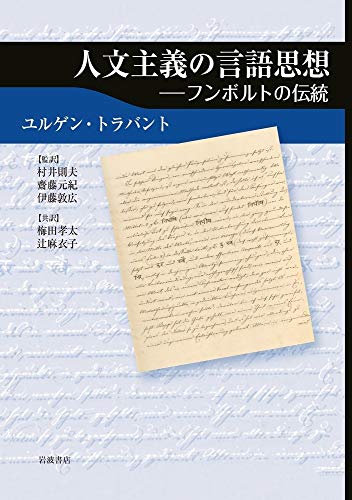2 0 0 0 人文主義の言語思想 : フンボルトの伝統
- 著者
- ユルゲン・トラバント [著] 梅田孝太 辻麻衣子共訳
- 出版者
- 岩波書店
- 巻号頁・発行日
- 2020
- 著者
- 梅田 孝太
- 出版者
- 日本ショーペンハウアー協会
- 雑誌
- ショーペンハウアー研究 (ISSN:09195971)
- 巻号頁・発行日
- no.3, pp.24-43, 2016-12
1 0 0 0 OA ニーチェ思想における徳としての正義 懲罰主義に対する批判
- 著者
- 梅田 孝太
- 出版者
- 日本哲学会
- 雑誌
- 哲学 (ISSN:03873358)
- 巻号頁・発行日
- vol.2022, no.73, pp.152-162, 2022-04-01 (Released:2022-07-21)
- 参考文献数
- 14
1 0 0 0 OA 生のセラピーとしての哲学 ニーチェ心理学とアンリ現象学をつなぐもの
- 著者
- 梅田 孝太
- 出版者
- 日本ミシェル・アンリ哲学会
- 雑誌
- ミシェル・アンリ研究 (ISSN:21857873)
- 巻号頁・発行日
- vol.10, pp.49-59, 2020 (Released:2020-06-28)
- 参考文献数
- 25
Philosophy can be understood as caring for the soul. In certain Greco–Roman traditions, the methods and doctrines of some schools of philosophy were considered to be therapeutic. For instance, this is acknowledged in texts on ancient medicine, especially those under the name of Hippocrates and also in the teachings of Epicurus. The understanding of philosophy as such was discussed by Nussbaum (1994) and Hadot (1995, 2002), and today the understanding of philosophy as therapeutic or as part of exercices spirituels is considered to shed light on the important role of philosophy. Although philosophy is commonly understood as a purely theoretical activity aimed at discovering truth, it is also widely understood as a part of care that helps us live a healthy and rational life. Hutter and Friedland (2013) and Faustino (2017) situate Nietzsche’s work in this tradition. Nietzsche referred to himself as a “psychologist” and repeatedly referred to his diagnoses of decadence and asceticism. However, as Werkhoven (2017) noted, the issues that Nietzsche diagnosed may be peculiar to modern people. Hutter (2013) does not explicitly treat of this gap; nevertheless, a certain distinction is needed between Nietzsche and the ancient exemplars of this tradition. Nietzsche’s own description of his therapy focuses on the affirmation of life. This approach assumes the modern understanding of life after the death of God. Here, what is life? What kind of therapy did Nietzsche suggest his suffering contemporaries? To pursue these themes, in this article, I revisit Michel Henry's interpretation of Nietzsche’s philosophy in relation to the phenomenology of life. In this context, I draw attention to the phenomenological dimension of Nietzsche’s therapy. I situate both in the tradition of philosophy as the therapy of life, which is an extension of the tradition of philosophical care, which has its origins in ancient times.

